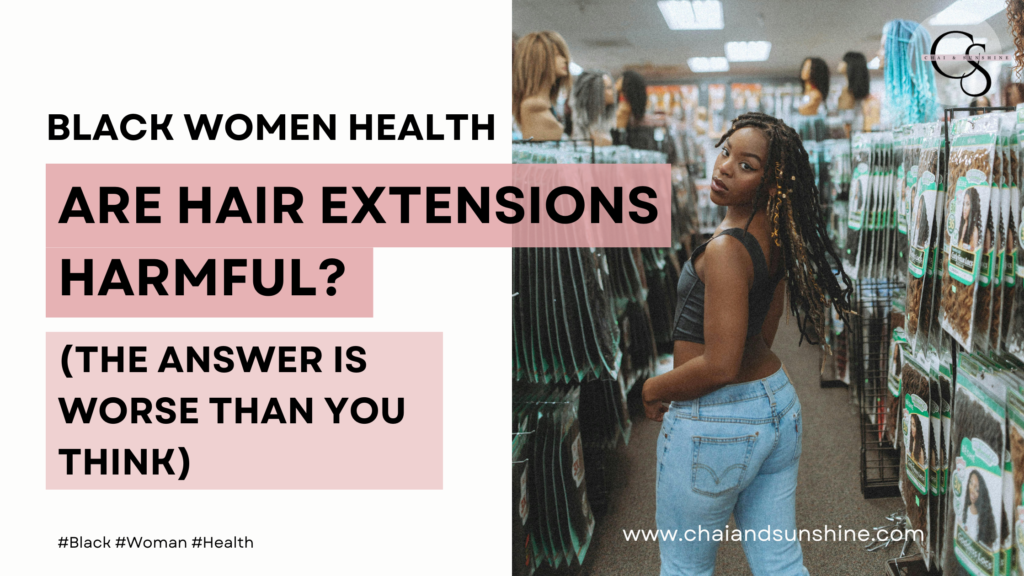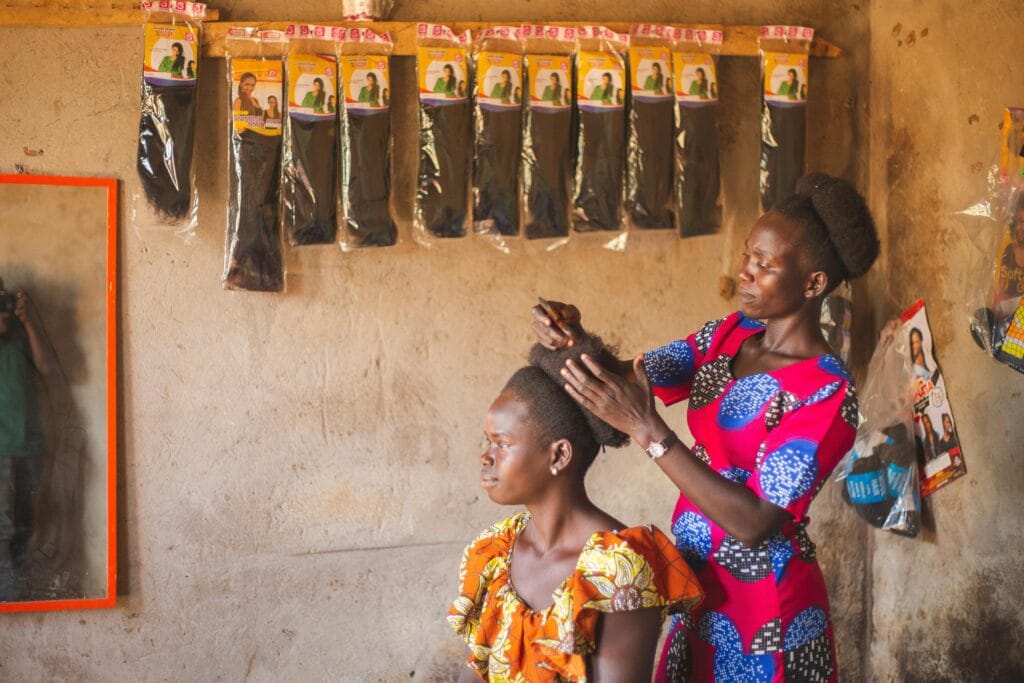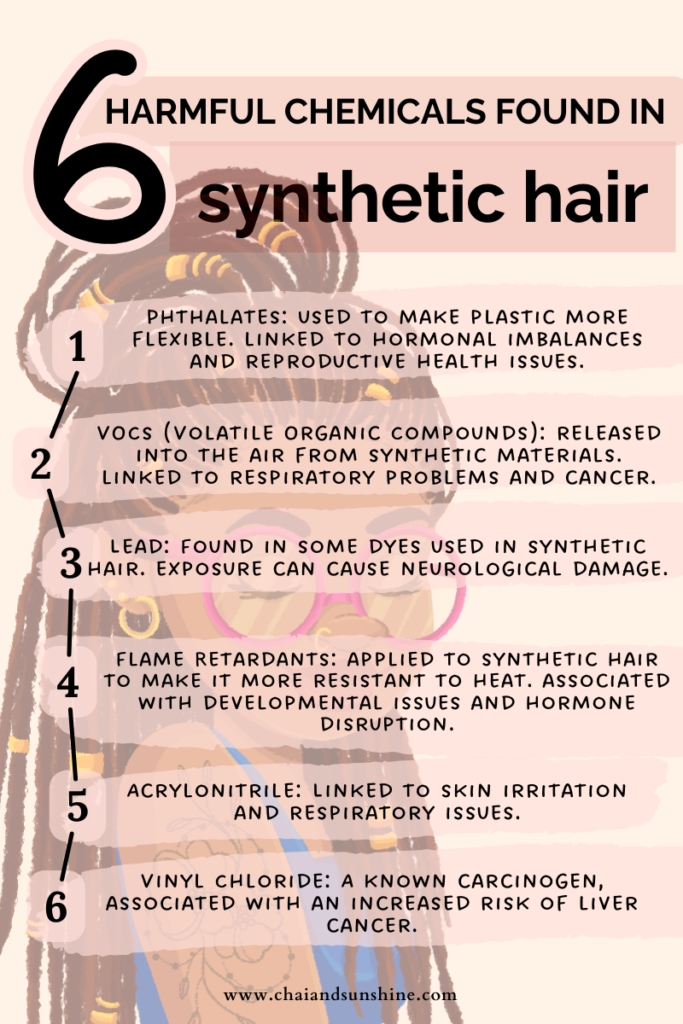Are Hair Extensions Harmful? New Shocking Research

Despite growing up in South Africa, where hair extensions are almost universally worn by black girls and women, I only really tried hair extensions well into adulthood. As someone with an Ethiopian family, it just wasn’t our zeitgeist.
But once the mood to experiment with colour and length without dyeing or cutting my hair struck me, there was only really one option.
So, I became part of the growing number of Black women who have embraced synthetic hair extensions.
I loved how I looked with them. They gave me a break from the time-consuming upkeep of my natural hair and allowed me to switch up my style whenever I wanted.
But one day, as I was packing our things to move homes, I noticed a silky-haired wig at the back of my closet.
And a question occurred to me:
“Are hair extensions harmful?” I wondered.
And then many more: “Does the weight of the extensions damage my roots? Do they hurt my scalp? Why are they so itchy sometimes?”
Here are my findings from that Google rabbit hole…
Table of Contents
ToggleAre Hair Extensions Harmful to My Hair?
Have you ever experienced that dull, persistent headache after getting a fresh install? The tight pulling at your scalp as your hair is braided, often tighter than necessary to “make it last”? It’s not just discomfort—it’s your body telling you something is wrong.
Traction alopecia, a condition where hair is pulled from the root, is no joke. It’s common among women who wear their hair in tight styles like braids, weaves, or even buns for extended periods of time.
When hair is pulled repeatedly, especially with the added weight of synthetic extensions, it can lead to permanent hair loss.
Most black women I know opt for the tightly pulled look because it lasts long (4-6 weeks) and is a whole lot neater than a looser braid.
Personally, I have a very low threshold for discomfort. I always did my extensions myself, and redid them when they felt a bit tight. But the trade-off is that mine didn’t last nearly as long.
But there are plenty of older black women with little patches of thinning hair at their temples and a receding hairline, likely from tightly pulling hairstyles.
So, it turns out that what we’ve called “protective styles” often leads to damaging our hair.

Are Hair Extensions Harmful to My Health?
Whether you had a tight braid or a looser variety, extensions make it hard to sleep. But it’s worse if it’s tight. I’m sure many of you can relate—tossing and turning with a tight, uncomfortable scalp, trying to find a way to rest without pulling on your hair.
Even once the pain reduces, there is still the matter of trying to sleep with this massive volume of hair on the back of your head. Whether you tie a top knot or tie it downwards, it still affects how you can sleep, both by its positioning and the weight it carries.
Discomfort, lack of sleep, and the stress of maintaining extensions add up. And there wasn’t an easy solution. Not wearing extensions (and all the maintenance that comes with that) caused me as much anxiety as wearing them did.
But in the world of the black woman, it’s often a case of damned if you do, damned if you don’t.

New Research: The Hidden Chemicals in Synthetic Hair Extensions (!!!)
But I knew all that.
This is what made my chuck our all my extensions and wigs.
New research has begun to reveal how synthetic hair extensions are often treated with chemicals that may be harmful to our health.
Recent studies have found that many of these extensions contain chemicals like
- phthalates (a reproductive disrupter),
- volatile organic compounds (VOCs) (damages the central nervous system),
- acrylonitrile (skin and respiratory issues), and
- vinyl chloride (carcinogen: linked to liver cancer).
These wonderful chemicals are found in most synthetic fibers like Kanekalon. and are often absorbed through the scalp, especially when heat is applied during styling, or when the extensions are worn for long periods.
Moreover, synthetic extensions release extra VOCs during heat styling, potentially aggravating respiratory conditions like asthma, especially in black communities already vulnerable to health disparities.
These findings point to an urgent need for better consumer protection and more research on the long-term effects of synthetic hair extensions. The lack of regulation allows these toxins to continue being used despite their risks.
(We’ll come back to regulation and trusting the government on health matters later).

Cultural Mistrust of Research: Why We Have to Do Our Own Homework
As Black women, we’ve often been the last to benefit from scientific research, and sometimes, we’ve been unwilling participants. From the ‘doctor’, now named ‘the father of gynaecology’, who purchased black slave women to experiment on to Henrietta Lacks, whose cervical cancer cells was taken without consent by Johns Hopkins, there’s a long history of Black people, particularly Black women, being mistreated or entirely ignored by the research community.
This historical exploitation leads many of us to mistrust medical professionals and researchers—and honestly, with good reason. When was the last time you saw a major beauty brand release information specifically about the long-term health effects of the products we use daily, especially those marketed to Black women?
We’re left to do our own research, trying to decipher ingredient lists that are confusing at best and intentionally misleading at worst. It’s an added burden that falls disproportionately on us.
We’re responsible for keeping ourselves informed, asking the hard questions about what we’re putting on our heads—and by extension, what’s seeping into our bodies.
That’s why I decided to stop using synthetic hair extensions altogether.
It was a hard choice.
Like many of you, I love the versatility, the ease, and the beauty of the styles I could achieve with extensions. But once I knew the risks, I couldn’t justify continuing.
For me, the potential damage to my health—and the health of my loved ones—just wasn’t worth it.
The Pressure to Have "Good Hair"
Black women have long been pressured to conform to the idea of “good hair.” Its a concept rooted in Eurocentric beauty standards that prize straight, silky hair over our natural textures.
This pressure has resulted in natural Black hairstyles—whether coily, kinky, or braided—being labeled as unkempt, messy, unprofessional, or even ugly.
These harmful stereotypes are a symptom of Western beauty ideals. Ones that have historically excluded Black features and textures from the definition of beauty.
As Black women, we need to lean into the discomfort we might feel on “bad hair days” and question whether the shame we experience stems from deeply internalised racism.
By embracing our natural hair, even in its most unruly moments, we resist these limiting standards and affirm that our beauty is not determined by proximity to whiteness.
Are There Alternatives?
So, where does that leave us? Are we supposed to just give up extensions entirely?
The truth is, yes, there are alternatives.
But each comes with its own set of challenges.
Human hair extensions, for example, are often seen as a safer option because they don’t contain the same synthetic chemicals. However, they come with ethical concerns, as the hair is sometimes sourced from women in underprivileged regions who are paid very little.
If you do decide to continue using extensions, here are some tips to minimise the risks:
- Opt for human hair whenever possible. It’s not perfect, but it’s generally a safer option than synthetic hair.
- Read labels: Look for brands that are transparent about what’s in their products and prioritise using non-toxic materials.
- Give your scalp a break: Don’t wear extensions for too long. Giving your scalp time to breathe will help prevent traction alopecia and reduce your exposure to harmful chemicals.
- Listen to your body: If your scalp is sore, or if you’re experiencing headaches or discomfort, take it as a sign that something’s wrong.
Final Thoughts
At the end of the day, our hair is an important part of our identity. But it shouldn’t come at the expense of our health.
I know it’s hard to break away from synthetic extensions, but once you understand the potential dangers, it’s hard to ignore them.
For me, the choice was clear: I had to cut ties with synthetic hair extensions for the sake of my health and my peace of mind.
I encourage you to do your research, stay informed, and make the choice that’s best for you. Our beauty shouldn’t come at a cost we’re not willing to pay.
Comment below with your thoughts. As always, Chai & Sunshine is and will remain a safe space for black women.
